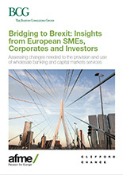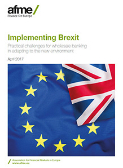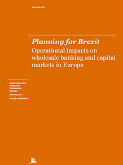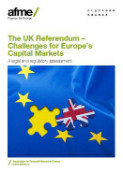AFME has an ongoing programme of work dedicated to highlighting the impact of Brexit for pan-European capital markets.
jeudi 02 novembre 2017 AFME Visiter le site sourceHouse of Lords Evidence
On 18th October, AFME Chief Executive, Simon Lewis, gave evidence to the House of Lords EU Financial Affairs Sub-Committee on regulation and supervision of financial services post-Brexit - Click here to watch
AFME’s position on Brexit
AFME takes a firmly fact-based approach in our engagement on Brexit, acting as a bridge for conveying market expertise and insight to policymakers and regulators across Europe.
Our work has assessed the implications for banks and end users of wholesale markets and identified a number key issues for maintaining the integrity of financial markets across Europe throughout the Brexit process:
- Clear transitional arrangements: We are
strongly in favour of clearly defined transitional arrangements
that will allow for an orderly transition, avoid ‘cliff edges’ and
ensure the stability of financial markets during the UK’s
withdrawal.
Such arrangements should comprise a bridging period where existing structures and regulations continue while the UK and EU27 negotiate their future trade relationship, as well as an adaptation period to allow businesses time to adapt to the new trading environment.
They would need regulatory and legal underpinning to give businesses the level of certainty they need.
- Continuity of existing contracts: Providing certainty of the continuity of existing financial contracts after the UK’s withdrawal, such as for swaps and loans would remove a significant source of uncertainty and potential disruption for banks and clients.
- Regulatory clarity: We would call on
regulators and policymakers to provide clarity as to their
requirements and take a pragmatic and flexible approach to
assisting firms in adjusting to post-Brexit requirements.
Regulators can help to minimise the disruption of any Brexit restructuring that might be needed by providing firms with as much clarity as possible about what arrangements they will need to put in place.
It is inevitable that there will be some regulatory uncertainty throughout the Brexit process. But approaches such as accelerating approval processes e.g.for new licences and pre-approving business models that firms can use, are examples of how a flexible approach could work.
Impact of Brexit on cross-border financial services contracts (September 2017)

Bridging to Brexit: Insights from European SMEs, Corporates and Investors (July 2017)

Implementing Brexit: Practical challenges for wholesale banking in adapting to the new environment (April 2017)

Planning for Brexit - Operational impacts on wholesale banking and capital markets in Europe (January 2017)

The UK Referendum: Challenges for Europe's Capital Markets (March 2016)
How Europe's capital markets interconnect

Our infographic,'How Europe's capital markets interconnect', shows the contribution the UK makes to Europe’s capital markets. You can download the AFME capital markets infographic, as well as the sourcesand data behind it.
PRUDENTIAL REGULATION

Oliver Moullin
Programme Director, Brexit and Head of Recovery and Resolution
+44 (0)20 3828 2712

